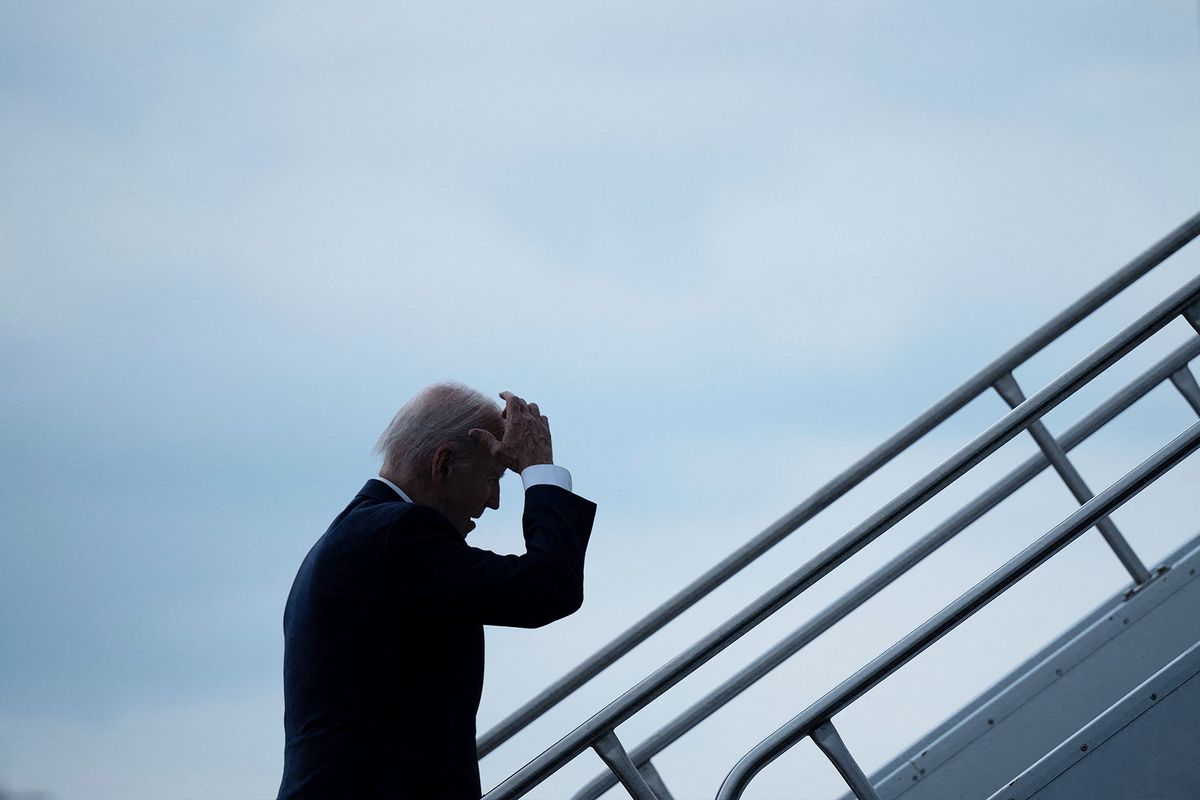President Joe Biden will leave the presidential ticket, bowing to pressure from top donors, moderate representatives and strategists within the Democratic Party.
After an uninspiring debate performance sent party leaders and pundits into chaos — which was only intensified by the deepest-pocketed Democratic financiers pulling their support of the candidate — Biden will not be moving forward in his plan to beat Donald Trump, clearing the way for another candidate to pick up the fight in his stead.
In an official letter from Biden posted to social media on Sunday afternoon, he writes, "It has been the greatest honor of my life to serve as your president. And while it has been my intention to seek reelection, I believe it is in the best interest of my party and the country for me to stand down and to focus solely on fulfilling my duties as president for the remainder of my term."
Biden thanks Vice President Kamala Harris in his letter for "being an extraordinary partner in all this work," but makes no mention of handing the reins to her, although he does so in a later post to social media, writing, "Today I want to offer my full support and endorsement for Kamala to be the nominee of our party this year. Democrats — it’s time to come together and beat Trump. Let’s do this."
Biden, who was approached by the senior-most Democrats in each chamber of the legislature earlier this week, caved to pressure to step down after serving a wildly successful term, by most indications. However, a three-week civil war within the Democratic Party dashed his hopes of continuing the work he started.
What happened?
At the start of a second term, Joe Biden, 81, would have been the oldest elected president in U.S. history. But the vast majority of Democratic voters embraced his candidacy during the party’s primary, with Biden winning over 87% of the vote.
Struggling to improve favorability and poll numbers in a stagnant race, Biden headed into the first presidential debate in a dead heat in polling averages.
His performance during the CNN debate — in which he gave rambling answers in a quiet, at times barely intelligible voice, while his opponent delivered lies and racially charged rhetoric with comparable vigor — opened a flood of questions about his fitness to serve, and crucially, his chances of winning in November.
Initially steadfast, President Biden received the vocal support of top Democrats including former President Barack Obama and Speaker Emerita Nancy Pelosi, and took to the campaign trail to crush chatter, making roughly two dozen stops in the two weeks following the debate.
Immediately after the debate, a handful of congresspeople and a more significant chunk of Democratic donors voiced their public opposition to the aging president’s candidacy, with voters expressing discontent with both candidates in polls following the event.
But days after the performance, the president remained committed to sticking in the race, as calls against him climbed slowly and fundraisers froze in their tracks.
Want a daily wrap-up of all the news and commentary Salon has to offer? Subscribe to our morning newsletter, Crash Course.
Top strategist James Carville went so far as to tell donors to put pressure on down-ballot candidates, instructing them to turn off the faucet for candidates who didn’t call for ticket change.
The president and his critics stood at a stalemate until actor George Clooney penned a call in the New York Times for the beleaguered Biden to leave the race, calling it his duty to “save democracy” by calling it quits. The op-ed opened the floodgates amongst donors, who pulled millions of dollars in planned donations contingent on a new candidate.
Biden, who left the door open to dropping out in an interview with ABC’s George Stephanopoulos, saying he’d only leave the race if pollsters told him “there’s no way you can win,” apparently heard just that from congressional leaders, including Pelosi, House Speaker Hakeem Jeffries, and Senate Majority Leader Chuck Schumer in closed-door meetings over the past weeks.
Schumer and Jeffries reportedly scrambled the president’s efforts to secure a virtual confirmation vote ahead of the party’s official convention on August 19, sowing further doubt in the president’s candidacy.
President Biden’s late-campaign COVID diagnosis forced the candidate to step back from the trail, keeping him from campaigning and fundraising amid the highly publicized Republican National Convention, where surrogates and sycophants for his opponents took shots at Biden’s advanced age and increasingly commonplace verbal flubs.
But perhaps a more imminent concern than the president’s health was his support amongst the billionaire and millionaire elites of the party, who his campaign relied on for fundraising. Per NBC News, the Biden campaign’s original big donor fundraising projections were slashed by 75% by Thursday, as the Trump campaign pulled in hundreds of millions of commitments from tech and business leaders like Elon Musk.



Shares